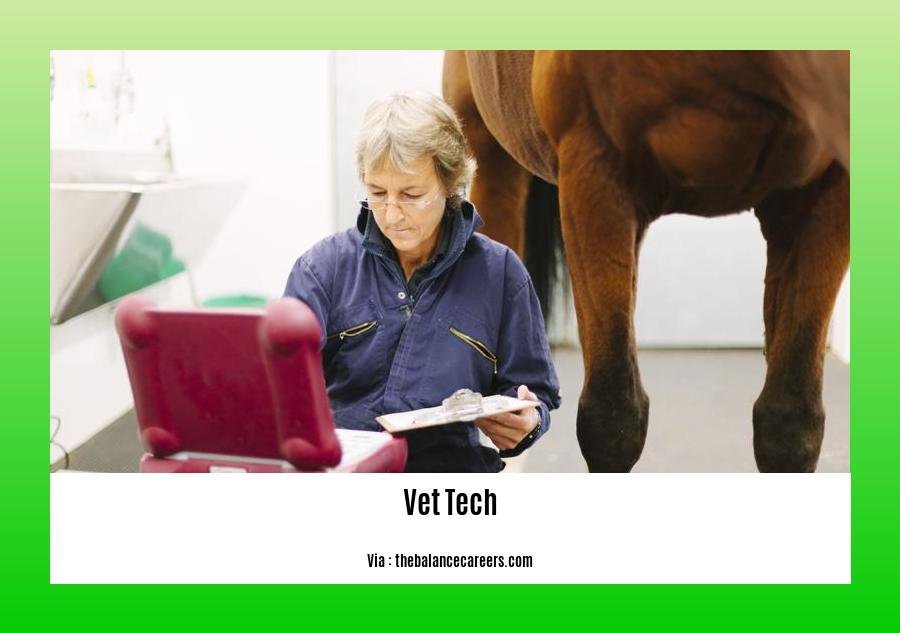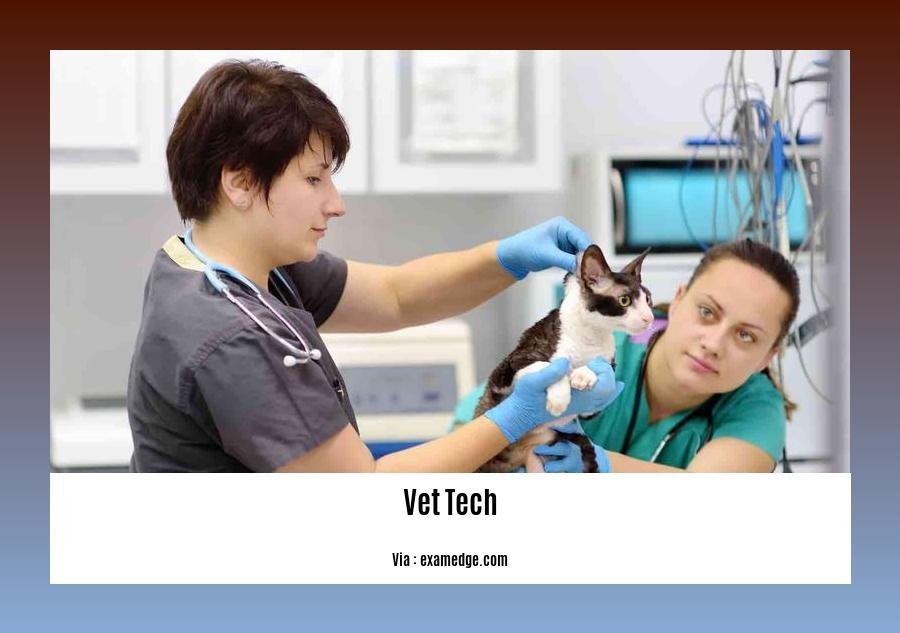Can a Vet Tech Become a Veterinarian? Exploring the Path from Technician to Doctor.
Are you a passionate veterinary technician looking to take your career to the next level? If you’ve ever wondered if it’s possible for a vet tech to become a veterinarian, you’re in the right place. In this article, we will delve into the journey of transitioning from a technician to a doctor in the veterinary field. Discover the opportunities, challenges, and requirements involved in pursuing this rewarding career path. So, let’s explore the possibilities and see if your dreams of becoming a veterinarian can become a reality!
Key Takeaways:
- Veterinary technicians can become veterinarians through additional educational and experience requirements.
- Some states allow vet techs to take the VTNE exam if they meet specific work experience or training program criteria.
- Both vet techs and veterinarians must pass state licensure exams.
- Vet techs can specialize in 16 areas recognized by the National Association of Veterinary Technicians in America.
- It is not an easy transition from vet tech to veterinarian, but it prepares individuals for a fulfilling career in veterinary medicine.
- Working as a vet tech before becoming a vet offers advantages such as industry connections and previous knowledge.
- Vet techs assist veterinarians with both basic and advanced medical care for animals.
- Veterinarians are medical professionals responsible for providing healthcare to animals.
Can a Vet Tech Become a Veterinarian?

If you’re a veterinary technician with a strong passion for animal care and a deep desire to progress in your veterinary career, you might be wondering if you can become a veterinarian. The answer is yes, it is possible for a vet tech to become a veterinarian, but the journey requires additional education and experience.
Understanding the Transition
To become a veterinarian, vet techs need to fulfill certain educational and experience requirements. In some states, such as Alaska, California, and Wisconsin, vet techs are allowed to take the Veterinary Technician National Exam (VTNE) after completing a specific amount of work experience or an alternative training program. Both vet techs and veterinarians are also required to pass state licensure exams.
Expanding Your Education
While vet techs have practical experience in animal care, they typically have an associate degree or a two-year veterinary technology program. On the other hand, veterinarians are required to have a Doctor of Veterinary Medicine (DVM) degree, which usually takes four years to complete. This means that vet techs who aspire to become veterinarians will need to pursue further education, such as completing a bachelor’s degree and applying to a DVM program.
Advantages of Being a Vet Tech
Although transitioning from a vet tech to a veterinarian is not an easy path, the experience gained as a vet tech can be highly beneficial. Working as a vet tech provides valuable industry connections and firsthand knowledge of veterinary procedures, medications, and protocols. This practical experience can be advantageous when pursuing a career as a veterinarian, as it allows vet techs to build upon their existing skills and expertise.
The Path Forward
To begin the journey from vet tech to veterinarian, it’s important to start by researching the specific educational requirements of the DVM program you wish to pursue. Most programs require a bachelor’s degree as a prerequisite, so vet techs will need to complete any additional courses or credits necessary to fulfill this requirement. Additionally, it’s crucial to maintain a high GPA and gain relevant experience through internships or job shadowing opportunities.
Specializations in Veterinary Medicine
Similar to how there are specialized areas within the field of veterinary technology, there are also areas of specialization for veterinarians. The National Association of Veterinary Technicians in America recognizes 16 areas of specialization for vet techs. Likewise, veterinarians can specialize in various areas such as dermatology, radiology, or surgery. Exploring these areas of specialization can further enhance your veterinary career and provide opportunities for growth and advancement.
The Rewarding Path
While the transition from vet tech to veterinarian requires dedication, hard work, and additional education, it paves the way for a fulfilling career in the field of veterinary medicine. As a veterinarian, you’ll have the opportunity to make a significant impact on the well-being and lives of animals. With your passion for animal care and the wealth of knowledge and experience gained as a vet tech, you’ll be equipped to provide comprehensive healthcare and compassionate treatment to all species.
So, if you’ve been wondering if a vet tech can become a veterinarian, the answer is yes! With determination, further education, and a commitment to expanding your skills, you can take the next step in your veterinary career and embark on the challenging yet rewarding path of becoming a veterinarian.
Can a vet tech become a vet? Find out here by clicking on this link.
Curious about whether a veteran’s spouse can get medical benefits? Discover the answer now by clicking on this link.
Challenges and Considerations for Vet Techs Aspiring to Become Veterinarians
As a vet tech, you already have a deep passion for animal care and a strong foundation in veterinary medicine. You’ve gained valuable hands-on experience in assisting veterinarians, administering medications, conducting tests, and providing compassionate care to animals. Now, you may be wondering if you can take your career to the next level and become a veterinarian. In this article, we will explore the challenges and considerations for vet techs aspiring to become veterinarians.
The Road to Becoming a Veterinarian
Becoming a veterinarian requires a significant commitment of time, effort, and financial resources. Unlike the schooling required for becoming a veterinary technician, which generally involves completing an associate’s degree or a two-year veterinary technology program, becoming a veterinarian means pursuing a Doctor of Veterinary Medicine (DVM) degree. This typically involves completing a four-year undergraduate degree followed by four years of study in a veterinary medicine college.
Educational Requirements
One of the first challenges to consider is the additional education required to become a veterinarian. You will need to research the specific educational requirements of the DVM program you wish to pursue. It is important to maintain a high GPA in your undergraduate studies and fulfill any prerequisite coursework.
Transitioning from Vet Tech to Veterinarian
While your experience as a vet tech provides you with valuable industry connections and knowledge, there are still challenges to consider when transitioning to a veterinarian role. The responsibilities and scope of practice as a veterinarian are broader and more comprehensive. You will need to expand your knowledge in areas such as diagnostics, treatment planning, and surgical techniques.
Work Experience and Advancement Opportunities
Your experience as a vet tech can be a valuable asset as you pursue your goal of becoming a veterinarian. Not only will you have a better understanding of medical terminology and procedures, but you will also have the opportunity to observe and learn from veterinarians in different clinical settings. This work experience can also provide you with strong letters of recommendation and enhance your application to veterinary medicine colleges.
Financial Considerations
Another important consideration is the financial aspect of pursuing a career as a veterinarian. Veterinary school can be costly, and it is important to be prepared for the financial burden associated with tuition, fees, and living expenses during your years of study.
Pros and Cons of Pursuing a Career in Veterinary Medicine
Before making the decision to become a veterinarian, it is essential to weigh the pros and cons of pursuing a career in veterinary medicine. While it can be a highly rewarding and fulfilling profession for those with a passion for animals, it also comes with challenges such as demanding work hours, emotional stress, and the potential for high levels of student debt.
Key Takeaways:
- Becoming a veterinarian requires completing a DVM degree, which involves four years of undergraduate studies followed by four years of study in a veterinary medicine college.
- The additional education and coursework required can be a significant challenge for vet techs aspiring to become veterinarians.
- Transitioning from being a vet tech to a veterinarian means expanding your knowledge in various areas of veterinary medicine.
- Work experience as a vet tech can provide valuable industry connections, knowledge, and letters of recommendation.
- Financial considerations, including the cost of tuition and living expenses during veterinary school, should be taken into account.
- It is essential to weigh the pros and cons of pursuing a career in veterinary medicine before making a decision.
Sources:
1. Success in Veterinary Practice: Can a Veterinary Technician Become a Veterinarian?
2. Used Vet Equipment: Can a Veterinary Technician Become a Veterinarian?
Benefits and Advantages of Being a Vet Tech Before Becoming a Veterinarian

As a veterinary technician, you have already embarked on an exciting and fulfilling career in the field of animal care. But have you ever wondered if you can take your passion a step further and become a veterinarian? The answer is yes, and there are several benefits and advantages to being a vet tech before pursuing a career as a veterinarian. In this article, we will explore these benefits and shed light on why your experience as a vet tech can set you up for success as a veterinarian.
Gaining Practical Skills and Experience
One of the major advantages of being a vet tech before becoming a veterinarian is the opportunity to gain hands-on experience and develop practical skills. As a veterinary technician, you have likely worked closely with veterinarians in various clinical settings, assisting in surgeries, administering medications, conducting laboratory tests, and providing compassionate care to animals. This invaluable experience not only gives you a deep understanding of animal health and medical procedures but also enhances your ability to handle veterinary emergencies effectively. [Benefits and advantages of being a vet tech before becoming a veterinarian]
Building Industry Connections
Another significant benefit of working as a vet tech before pursuing a career as a veterinarian is the chance to build valuable industry connections. Throughout your time as a veterinary technician, you have likely interacted with experienced professionals who can serve as mentors, offer advice, and provide you with exciting opportunities. These connections can be instrumental in guiding you through your educational journey and helping you navigate the transition from vet tech to veterinarian. [Benefits and advantages of being a vet tech before becoming a veterinarian]
Academic Advantages
While you may already have an associate degree or a two-year veterinary technology program under your belt as a vet tech, pursuing further education to become a veterinarian is still necessary. However, your previous academic achievements and experience as a vet tech can give you a head start in your journey to becoming a veterinarian. You may have already acquired knowledge of veterinary terminology, medical procedures, and animal care protocols that can be confusing for new students entering veterinary medicine. This familiarity can help you adapt to the rigorous coursework and clinical training required to complete a Doctor of Veterinary Medicine (DVM) degree. [Benefits and advantages of being a vet tech before becoming a veterinarian]
Enhanced Understanding of the Veterinary Field
When transitioning from a vet tech to a veterinarian, you bring a wealth of industry-specific knowledge and experience. This deep understanding of the veterinary field can make your educational journey more meaningful and your professional practice more comprehensive. You have witnessed firsthand the challenges and rewards of working with sick or injured animals, as well as the emotional toll it can take on both the animals and their owners. Through your experience as a vet tech, you have likely developed effective coping strategies that will help you navigate the emotional demands of working as a veterinarian. [Benefits and advantages of being a vet tech before becoming a veterinarian]
Career Advancement Opportunities
Becoming a veterinarian can open doors to advanced career opportunities and specialization within the field. As a veterinarian, you can choose to specialize in areas such as dermatology, radiology, or surgery, which allows for personal and professional growth. Your experience as a vet tech can provide a solid foundation for pursuing these specialized career paths and give you a competitive edge in the job market. [Benefits and advantages of being a vet tech before becoming a veterinarian]
Key Takeaways:
- Being a vet tech before becoming a veterinarian offers practical skills and experience that can enhance your ability to handle veterinary emergencies effectively. [Benefits and advantages of being a vet tech before becoming a veterinarian]
- Building industry connections through your work as a vet tech can provide valuable mentorship, advice, and career opportunities during your transition to becoming a veterinarian. [Benefits and advantages of being a vet tech before becoming a veterinarian]
- Your previous academic achievements as a vet tech, coupled with your knowledge of veterinary terminology and procedures, can give you an advantage in your educational journey towards a DVM degree. [Benefits and advantages of being a vet tech before becoming a veterinarian]
- Through your experience as a vet tech, you have developed coping strategies and gained a profound understanding of the emotional demands of working in the veterinary field. [Benefits and advantages of being a vet tech before becoming a veterinarian]
- Becoming a veterinarian opens doors to advanced career opportunities and specialization within the field, building upon the foundation you have as a vet tech. [Benefits and advantages of being a vet tech before becoming a veterinarian]
Sources:
– Success in Veterinary Practice: Can a Veterinary Technician Become a Veterinarian?
– Used Vet Equipment: Can a Veterinary Technician Become a Veterinarian?
Insights from vet techs who successfully became veterinarians
Becoming a veterinarian is a dream for many vet technicians who have the passion and drive to further their careers. While the transition from vet tech to veterinarian may not be easy, it is definitely possible with dedication and hard work. In this article, we will explore the benefits of becoming a veterinary technician before pursuing a career as a vet, as well as the considerations one should take when choosing a career in veterinary medicine.
The Benefits of Starting as a Vet Tech
One of the main benefits of starting as a vet tech before becoming a veterinarian is the opportunity to gain valuable experience and knowledge. As a vet tech, you have the chance to learn more about terminology and procedures that can be confusing for new students in veterinary medicine. This knowledge will give you a head start and make your transition to becoming a vet smoother.
When considering a career in veterinary medicine, there are several factors that you should take into account. Factors such as personal interest, educational requirements, financial feasibility, and the time commitment needed for each career path should be evaluated before making a decision.
Insights from Vet Techs Who Became Veterinarians
According to insights from vet techs who successfully became veterinarians, there are several important lessons and experiences that they have learned along their journey. These insights can provide valuable guidance for aspiring vet techs who aspire to become veterinarians.
- “Holding hands” (aka teaching): Vet techs have the opportunity to educate pet owners and share their knowledge, which is an important aspect of being a veterinarian.
- It’s okay to show empathy: Initially, vet techs may feel that showing emotions such as hugging clients is unprofessional. However, expressing empathy and offering comfort is an essential part of providing care.
- Asking for help is crucial: Vet techs should not be afraid to seek assistance from colleagues. This skill is important because no one can know everything, and collaboration is key in the veterinary field.
- Admitting mistakes: It’s human to make mistakes, but being able to admit and learn from them is what makes a great veterinary professional.
Conclusion
While the transition from vet tech to veterinarian may not be as easy as some may think, it can be a fulfilling and rewarding career choice. Gaining experience as a vet tech can provide you with valuable skills and knowledge that will contribute to your success as a veterinarian. It is important to carefully consider personal interests, educational requirements, and other factors before embarking on this career path.
Key Takeaways:
– Starting as a vet tech before becoming a veterinarian can provide valuable experience and knowledge.
– Personal interest, educational requirements, financial feasibility, and time commitment are important factors to consider when choosing a career in veterinary medicine.
– Insights from vet techs who successfully became veterinarians include the importance of teaching, showing empathy, asking for help, and admitting mistakes.
FAQ
Q1: What is a vet tech?
A1: A vet tech, or veterinary technician, is a trained professional who assists veterinarians in providing medical care to animals. They have practical experience in administering medications, conducting laboratory tests, and assisting in surgeries.
Q2: Can a vet tech become a veterinarian without further education?
A2: No, in order to become a veterinarian, a vet tech must complete additional educational and experience requirements. These may include earning a four-year undergraduate degree and completing four more years of study in a veterinary medicine college.
Q3: What are the advantages of starting as a vet tech before becoming a veterinarian?
A3: Starting as a vet tech before becoming a veterinarian offers advantages such as industry connections and previous knowledge. Vet techs build relationships with experienced professionals who can mentor, advise, or provide opportunities. Additionally, their previous knowledge and experience in the field can be beneficial in their transition from vet tech to veterinarian.
Q4: Are there any financial considerations when transitioning from a vet tech to a veterinarian?
A4: Yes, it is important to consider the financial feasibility of pursuing a career in veterinary medicine. The schooling required for becoming a veterinary technician is generally shorter than that for becoming a veterinarian, so individuals should assess the potential costs of additional education and the potential return on investment in terms of salary and career opportunities.
Q5: What are the key factors to consider when choosing a career in veterinary medicine?
A5: When choosing a career in veterinary medicine, factors such as personal interest, educational requirements, financial feasibility, and the time commitment needed for each career path should be evaluated. It is important to consider the pros and cons and make an informed decision based on individual circumstances and goals.














